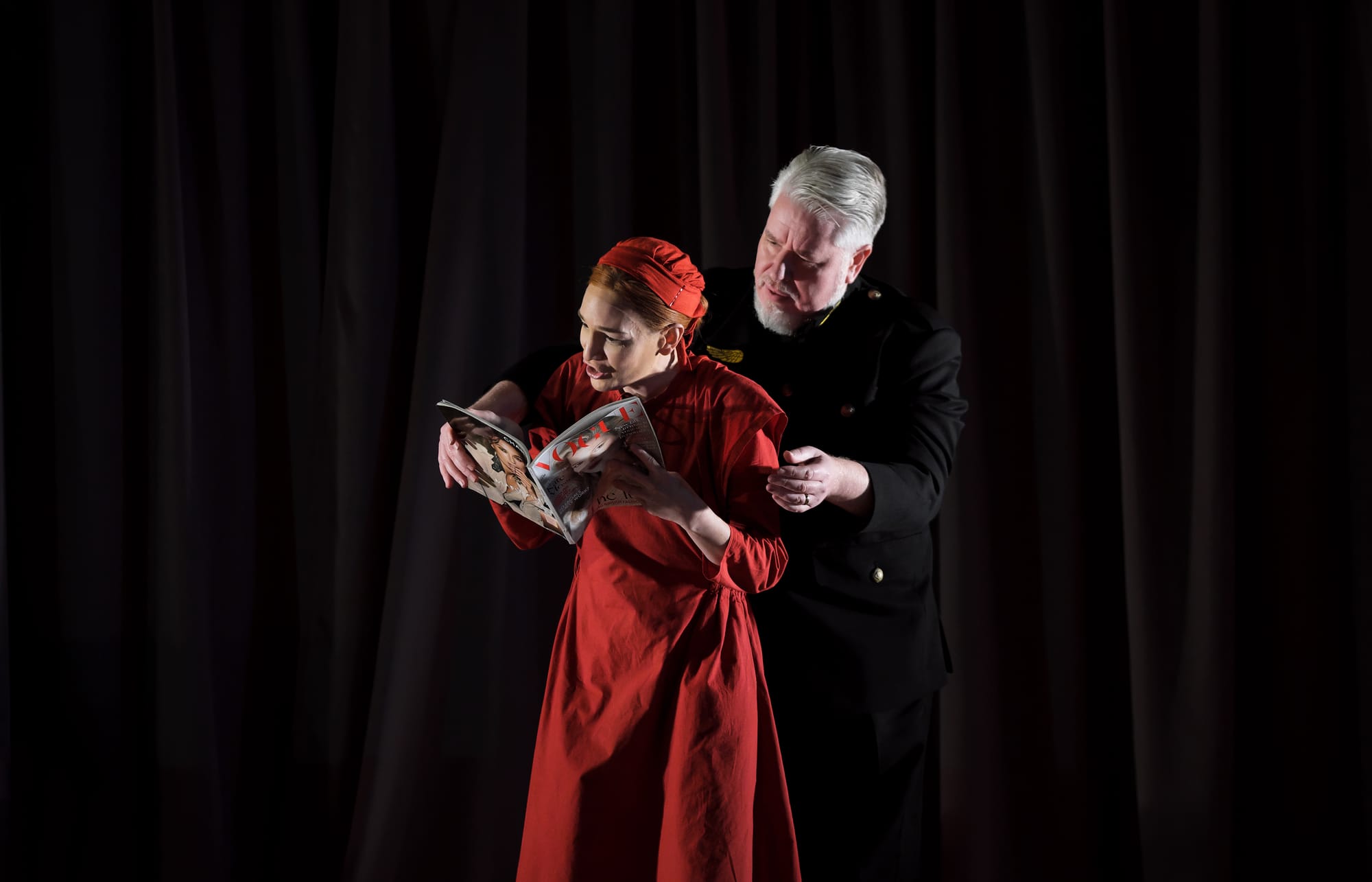Poul Ruders' The Handmaid's Tale at ENO

Ruders The Handmaid’s Tale Cast; Chorus and Orchestra of English National Opera / Joana Carneiro. 03.02.2024
Production:
Director – Annilese Miskimmon
Set and Costume designer – Annemarie Woods
Lighting designer – Paule Constable (revival lighting director Marc Rosette)
Video designer – Akhila Krishnan
Sound designer – Yvonne Gilbert
Movement director – Imogen Knights (revival director Anjali Mehra)
Cast:
Offred, Past & Present — Kate Lindsey
Professor Pieixoto – Camille Cottin
Luke – John Findon
Luke & Offred’s Daughter – Elspeth MacDonald / Francesca Ditchburn
Offred’s Mother – Susan Bickley
Aunt Lydia – Rachel Nichols
Moira – Nadine Benjamin
Janine / Ofwarren – Rhian Lois
Moira’s aunt – Helen Johnson
Serena Joy – Avery Amereau
The Commander – James Creswell
Rita – Madeleine Shaw
Nick – Zwakele Tshabalala
Ofglen – Eleanor Dennis
New Ofglen – Annabella-Vesela Ellis
The Doctor – Alan Oke
Warren’s Wife – Lydia Marchione
Commander X – Adam Sullivan
Guard – Ronald Nairne
Poul Ruders’ opera The Handmaid’s Tale remains an impressive piece of theatre. I do remember Phylida Lloyd’s staging, the UK premiere in 2003, although that was reviewed on this site by Marc Bridle (and his review includes photos that reveal just how different Lloyd’s production was in comparison to Miskimmon’s). More recently, I reviewed the present production in April 2022, including a fair amount of background information the reader might find useful.
Amazingly, a full dozen of the roles are the same in 2024 as in 2022. There are some big changes, though: actress Juliet Stevenson faultlssly took on the spoken, framing role of Professor Pieixoto, while Nadine Benjamin took over the role of Moira from Pumeza Matshikiza and James Creswell took over from Robert Hayward as The Commander.
Annliese Misimmon’s staging is both bold and simple. Colour and lighting play a huge part in its effectiveness (Paule Constable’s lighting, revived here by Marc Rosette, contributes hugely to the experience). The orchestra plays superbly under Joana Carneiro, the strings in perfect unanimity, the brass and woodwind playing with pinpoint accuracy. They play as if their lives depended on it (and maybe, given the current uncertainties, they do). The disembodied, floating handmaids’ outfits that one sees immediately on entering the theatre surely underline the unfeeling, objective nature of Maragret Atwood’s dystopian society.
Miskimmon offers something of a blank canvas on which the opera can play out; only the Soul Scrolls is more focused and detailed. The impetus for dramatic accuracy and conviction thus falls on the singers. Kate Lindsey was once more the most powerful of all present. She is a magnificent singer in many repertoires, but the central role of Offred (as in “Of Fred” as a name that designates her “ownership”) seems particularly suited to her. We are thrown into her plight and in turn those of all Handmaids; the whole impersonal nature of the sex and reproductive process, the threat of expulsion to ‘The Colonies,’ the bleak lack of hope. Ruders’ music, expert in its use of orchestra and electronics and featuring a recurring quotation from ‘Amazing Grace,’ remains supreme. This is his finest work so far, but it is a hard listen. I do wonder how many in the audience were prepared for it, for the first act (of two) was a bit like Ruders’ farewell symphony – there was an exodus of, if not Biblical, certainly notable proportions. Doubtless the TV series has a part to play. A pity, as the ‘particicution’ (a type of execution in which many play a part) was certainly a spectacle.

It is always wonderful to see Susan Bickley, and her stage presence remains undimmed (most recently prior to this, it was Duke Bluebeard’s Castle in Beijing, China for me, but she was no less impressive here as Offred’s mother). At the other end of operatic experience is the ever-blossomong Nadine Benjamin, superb (I have never seen her less) as Moira. James Creswell was a fine, stanch Commander, Avery Amereau brilliant as Serena Joy, the Commander’s wife. John Findon is similarly superb as Luke.
Rachel Nicholls coped well with Ruders’ demands in the part of Aunt Lydia, while Zwakle Tschabalala was an excellent actor as well as singer in the role of Nick. Rhian Lois was entirely convincing as Janine/Ofwarren; Eleanor Dennis was a perfect counterpart as Ofglen.
It is interesting how in this opera the men are often automatons, or at least archetypes: the idea of ‘The Commander’ and ‘The Doctor’ (the experienced Alan Oke) surely links back to Berg’s Wozzeck (where there is another Doctor, along with an obsessive Captain), while the women who are supposed to be oppressed and only valuable for their child-bearing functionality actually carry the emotive weight of the opera.
If I find Miskommon’s staging somewhat anonymous, there is no doubting the power of Ruders’ music as a fine echo of the power of Atwood’s book. With the dynamic Joane Carneira in the pit inspiring the ENO orchestra to great heights and the ENO Chorus in fine fettle, this remained a musically satisfying and powerful evening.
Title and "X" photo © Nicky Hamilton.
